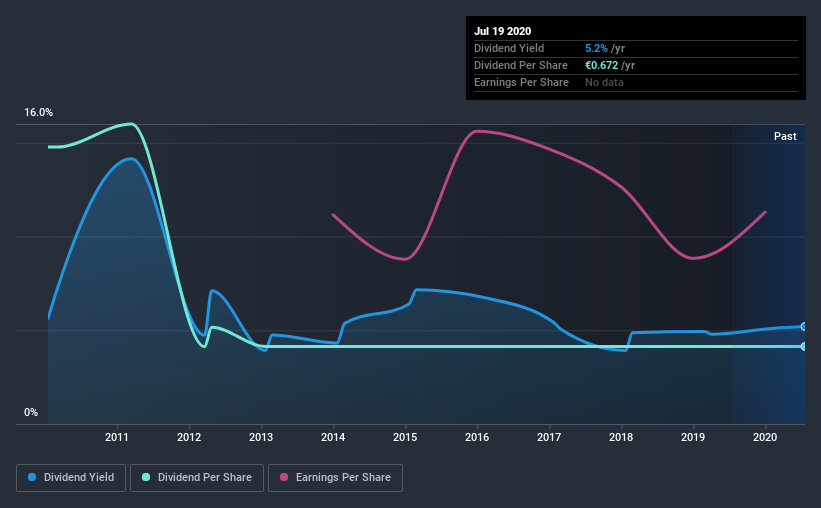- Greece
- /
- Diversified Financial
- /
- ATSE:TELL
Key Things To Consider Before Buying Bank of Greece (ATH:TELL) For Its Dividend
Dividend paying stocks like Bank of Greece (ATH:TELL) tend to be popular with investors, and for good reason - some research suggests a significant amount of all stock market returns come from reinvested dividends. On the other hand, investors have been known to buy a stock because of its yield, and then lose money if the company's dividend doesn't live up to expectations.
With Bank of Greece yielding 5.2% and having paid a dividend for over 10 years, many investors likely find the company quite interesting. We'd guess that plenty of investors have purchased it for the income. There are a few simple ways to reduce the risks of buying Bank of Greece for its dividend, and we'll go through these below.
Explore this interactive chart for our latest analysis on Bank of Greece!

Payout ratios
Companies (usually) pay dividends out of their earnings. If a company is paying more than it earns, the dividend might have to be cut. So we need to form a view on if a company's dividend is sustainable, relative to its net profit after tax. Bank of Greece paid out 1.6% of its profit as dividends, over the trailing twelve month period. We like this low payout ratio, because it implies the dividend is well covered and leaves ample opportunity for reinvestment.
Remember, you can always get a snapshot of Bank of Greece's latest financial position, by checking our visualisation of its financial health.
Dividend Volatility
From the perspective of an income investor who wants to earn dividends for many years, there is not much point buying a stock if its dividend is regularly cut or is not reliable. For the purpose of this article, we only scrutinise the last decade of Bank of Greece's dividend payments. The dividend has been cut on at least one occasion historically. During the past ten-year period, the first annual payment was €2.4 in 2010, compared to €0.7 last year. Dividend payments have fallen sharply, down 72% over that time.
A shrinking dividend over a ten-year period is not ideal, and we'd be concerned about investing in a dividend stock that lacks a solid record of growing dividends per share.
Dividend Growth Potential
Given that dividend payments have been shrinking like a glacier in a warming world, we need to check if there are some bright spots on the horizon. Bank of Greece has grown its earnings per share at 5.2% per annum over the past five years. A low payout ratio and strong historical earnings growth suggests Bank of Greece has been effectively reinvesting in its business. We think this generally bodes well for its dividend prospects.
Conclusion
Dividend investors should always want to know if a) a company's dividends are affordable, b) if there is a track record of consistent payments, and c) if the dividend is capable of growing. Firstly, we like that Bank of Greece has a low and conservative payout ratio. Unfortunately, earnings growth has also been mediocre, and the company has cut its dividend at least once in the past. Bank of Greece might not be a bad business, but it doesn't show all of the characteristics we look for in a dividend stock.
Market movements attest to how highly valued a consistent dividend policy is compared to one which is more unpredictable. Meanwhile, despite the importance of dividend payments, they are not the only factors our readers should know when assessing a company. To that end, Bank of Greece has 2 warning signs (and 1 which makes us a bit uncomfortable) we think you should know about.
If you are a dividend investor, you might also want to look at our curated list of dividend stocks yielding above 3%.
If you decide to trade Bank of Greece, use the lowest-cost* platform that is rated #1 Overall by Barron’s, Interactive Brokers. Trade stocks, options, futures, forex, bonds and funds on 135 markets, all from a single integrated account. Promoted
Valuation is complex, but we're here to simplify it.
Discover if Bank of Greece might be undervalued or overvalued with our detailed analysis, featuring fair value estimates, potential risks, dividends, insider trades, and its financial condition.
Access Free AnalysisThis article by Simply Wall St is general in nature. It does not constitute a recommendation to buy or sell any stock, and does not take account of your objectives, or your financial situation. We aim to bring you long-term focused analysis driven by fundamental data. Note that our analysis may not factor in the latest price-sensitive company announcements or qualitative material. Simply Wall St has no position in any stocks mentioned.
*Interactive Brokers Rated Lowest Cost Broker by StockBrokers.com Annual Online Review 2020
Have feedback on this article? Concerned about the content? Get in touch with us directly. Alternatively, email editorial-team@simplywallst.com.
About ATSE:TELL
Bank of Greece
Provides various financial products and services in Greece.
Good value second-rate dividend payer.
Similar Companies
Market Insights
Community Narratives



